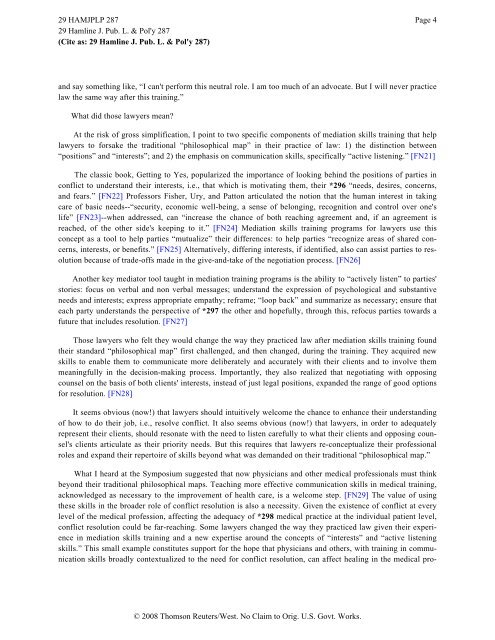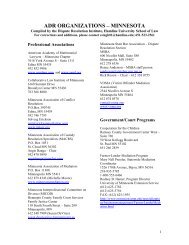Fall 2007 Symposium on Advanced Issues in Dispute Resoluti
Fall 2007 Symposium on Advanced Issues in Dispute Resoluti
Fall 2007 Symposium on Advanced Issues in Dispute Resoluti
Create successful ePaper yourself
Turn your PDF publications into a flip-book with our unique Google optimized e-Paper software.
29 HAMJPLP 287 Page 4<br />
29 Haml<strong>in</strong>e J. Pub. L. & Pol'y 287<br />
(Cite as: 29 Haml<strong>in</strong>e J. Pub. L. & Pol'y 287)<br />
and say someth<strong>in</strong>g like, “I can't perform this neutral role. I am too much of an advocate. But I will never practice<br />
law the same way after this tra<strong>in</strong><strong>in</strong>g.”<br />
What did those lawyers mean?<br />
At the risk of gross simplificati<strong>on</strong>, I po<strong>in</strong>t to two specific comp<strong>on</strong>ents of mediati<strong>on</strong> skills tra<strong>in</strong><strong>in</strong>g that help<br />
lawyers to forsake the traditi<strong>on</strong>al “philosophical map” <strong>in</strong> their practice of law: 1) the dist<strong>in</strong>cti<strong>on</strong> between<br />
“positi<strong>on</strong>s” and “<strong>in</strong>terests”; and 2) the emphasis <strong>on</strong> communicati<strong>on</strong> skills, specifically “active listen<strong>in</strong>g.” [FN21]<br />
The classic book, Gett<strong>in</strong>g to Yes, popularized the importance of look<strong>in</strong>g beh<strong>in</strong>d the positi<strong>on</strong>s of parties <strong>in</strong><br />
c<strong>on</strong>flict to understand their <strong>in</strong>terests, i.e., that which is motivat<strong>in</strong>g them, their *296 “needs, desires, c<strong>on</strong>cerns,<br />
and fears.” [FN22] Professors Fisher, Ury, and Patt<strong>on</strong> articulated the noti<strong>on</strong> that the human <strong>in</strong>terest <strong>in</strong> tak<strong>in</strong>g<br />
care of basic needs--“security, ec<strong>on</strong>omic well-be<strong>in</strong>g, a sense of bel<strong>on</strong>g<strong>in</strong>g, recogniti<strong>on</strong> and c<strong>on</strong>trol over <strong>on</strong>e's<br />
life” [FN23]--when addressed, can “<strong>in</strong>crease the chance of both reach<strong>in</strong>g agreement and, if an agreement is<br />
reached, of the other side's keep<strong>in</strong>g to it.” [FN24] Mediati<strong>on</strong> skills tra<strong>in</strong><strong>in</strong>g programs for lawyers use this<br />
c<strong>on</strong>cept as a tool to help parties “mutualize” their differences: to help parties “recognize areas of shared c<strong>on</strong>cerns,<br />
<strong>in</strong>terests, or benefits.” [FN25] Alternatively, differ<strong>in</strong>g <strong>in</strong>terests, if identified, also can assist parties to resoluti<strong>on</strong><br />
because of trade-offs made <strong>in</strong> the give-and-take of the negotiati<strong>on</strong> process. [FN26]<br />
Another key mediator tool taught <strong>in</strong> mediati<strong>on</strong> tra<strong>in</strong><strong>in</strong>g programs is the ability to “actively listen” to parties'<br />
stories: focus <strong>on</strong> verbal and n<strong>on</strong> verbal messages; understand the expressi<strong>on</strong> of psychological and substantive<br />
needs and <strong>in</strong>terests; express appropriate empathy; reframe; “loop back” and summarize as necessary; ensure that<br />
each party understands the perspective of *297 the other and hopefully, through this, refocus parties towards a<br />
future that <strong>in</strong>cludes resoluti<strong>on</strong>. [FN27]<br />
Those lawyers who felt they would change the way they practiced law after mediati<strong>on</strong> skills tra<strong>in</strong><strong>in</strong>g found<br />
their standard “philosophical map” first challenged, and then changed, dur<strong>in</strong>g the tra<strong>in</strong><strong>in</strong>g. They acquired new<br />
skills to enable them to communicate more deliberately and accurately with their clients and to <strong>in</strong>volve them<br />
mean<strong>in</strong>gfully <strong>in</strong> the decisi<strong>on</strong>-mak<strong>in</strong>g process. Importantly, they also realized that negotiat<strong>in</strong>g with oppos<strong>in</strong>g<br />
counsel <strong>on</strong> the basis of both clients' <strong>in</strong>terests, <strong>in</strong>stead of just legal positi<strong>on</strong>s, expanded the range of good opti<strong>on</strong>s<br />
for resoluti<strong>on</strong>. [FN28]<br />
It seems obvious (now!) that lawyers should <strong>in</strong>tuitively welcome the chance to enhance their understand<strong>in</strong>g<br />
of how to do their job, i.e., resolve c<strong>on</strong>flict. It also seems obvious (now!) that lawyers, <strong>in</strong> order to adequately<br />
represent their clients, should res<strong>on</strong>ate with the need to listen carefully to what their clients and oppos<strong>in</strong>g counsel's<br />
clients articulate as their priority needs. But this requires that lawyers re-c<strong>on</strong>ceptualize their professi<strong>on</strong>al<br />
roles and expand their repertoire of skills bey<strong>on</strong>d what was demanded <strong>on</strong> their traditi<strong>on</strong>al “philosophical map.”<br />
What I heard at the <str<strong>on</strong>g>Symposium</str<strong>on</strong>g> suggested that now physicians and other medical professi<strong>on</strong>als must th<strong>in</strong>k<br />
bey<strong>on</strong>d their traditi<strong>on</strong>al philosophical maps. Teach<strong>in</strong>g more effective communicati<strong>on</strong> skills <strong>in</strong> medical tra<strong>in</strong><strong>in</strong>g,<br />
acknowledged as necessary to the improvement of health care, is a welcome step. [FN29] The value of us<strong>in</strong>g<br />
these skills <strong>in</strong> the broader role of c<strong>on</strong>flict resoluti<strong>on</strong> is also a necessity. Given the existence of c<strong>on</strong>flict at every<br />
level of the medical professi<strong>on</strong>, affect<strong>in</strong>g the adequacy of *298 medical practice at the <strong>in</strong>dividual patient level,<br />
c<strong>on</strong>flict resoluti<strong>on</strong> could be far-reach<strong>in</strong>g. Some lawyers changed the way they practiced law given their experience<br />
<strong>in</strong> mediati<strong>on</strong> skills tra<strong>in</strong><strong>in</strong>g and a new expertise around the c<strong>on</strong>cepts of “<strong>in</strong>terests” and “active listen<strong>in</strong>g<br />
skills.” This small example c<strong>on</strong>stitutes support for the hope that physicians and others, with tra<strong>in</strong><strong>in</strong>g <strong>in</strong> communicati<strong>on</strong><br />
skills broadly c<strong>on</strong>textualized to the need for c<strong>on</strong>flict resoluti<strong>on</strong>, can affect heal<strong>in</strong>g <strong>in</strong> the medical pro-<br />
© 2008 Thoms<strong>on</strong> Reuters/West. No Claim to Orig. U.S. Govt. Works.
















